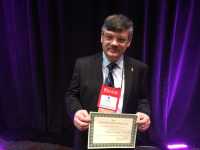06 Apr Pre-Clinical Study of Tbit™ System for Detection of Traumatic Brain Injury
MedicalResearch.com Interview with:
Sergey A. Dryga, PhD, MBA
Chief Scientific Officer
BioDirection, Inc.
MedicalResearch.com: What is the background for this study? What are the main findings?
Response: When patients have suffered a head injury, they typically undergo a series of subjective cognitive tests to confirm a diagnosis of a concussion or other traumatic brain injury. In many cases these tests are inaccurate and inconsistent, increasing the risk of misdiagnosis. In other cases, patients may undergo an unnecessary CT scan, which is costly and exposes them to radiation. Early, objective diagnostic testing of patients who have experienced a head injury can support more rapid and appropriate treatment decisions while potentially reducing the use of unnecessary CT scans or other forms of intervention.
We know that protein biomarkers, including S100 calcium binding protein beta (S100β) and glial fibrillary acidic protein (GFAP), are released from the brain into the bloodstream immediately following a concussion or other traumatic brain injury. The Tbit™ System is a new medical device based on a nanotechnology biosensor that rapidly detects and accurately measures these protein biomarkers. The system includes a disposable cartridge and portable analyzer designed for testing using a single drop of blood at the earliest stages of a concussion.
This pre-clinical study was designed to evaluate the ability of the Tbit System to screen traumatic brain injury patients for a CT positive or CT negative test. Frozen plasma samples were collected from a total of 100 patients who had undergone CT scans post hospital admission. The Tbit System demonstrated 100% sensitivity with no false negative results, and a 41% specificity level.
MedicalResearch.com: What should readers take away from your report?
Response: These results suggest the Tbit System provides a sensitive and rapid diagnostic platform that enables the detection of biomarkers at the molecular level. We demonstrated the potential to detect any brain injury that requires further assessment while reducing the number of unnecessary CT scans by over 40%.
MedicalResearch.com: What recommendations do you have for future research as a result of this study?
Response: We look forward to conducting formal clinical trials to support an FDA review of the first technology positioned to deliver a rapid and objective point-of-care blood test for concussion diagnosis.
The Tbit System has a broad range of potential applications because it can detect biomarkers in a complex biological sample. Emerging biomarker research is leading to a new era of diagnostics in other neurological conditions including stroke and Alzheimer’s disease.
MedicalResearch.com: Is there anything else you would like to add?
Response: In March the pre-clinical study received the best overall abstract award in neurotechnology among more than 800 submissions at the International Brain Injury Association’s 12th World Congress on Brain Injury, the world’s largest gathering of clinicians, scientists, and industry representatives focused on brain injury.
Disclosures: I am chief scientific officer of BioDirection, a privately held medical device company developing the Tbit System.
MedicalResearch.com: Thank you for your contribution to the MedicalResearch.com community.
Citation:
The International Brain Injury Association’s 12th World Congress on Brain Injury
http://www.internationalbrain.org/the-12th-world-congress-on-brain-injury/
Note: Content is Not intended as medical advice. Please consult your health care provider regarding your specific medical condition and questions.
More Medical Research Interviews on MedicalResearch.com
[wysija_form id=”5″]
Last Updated on April 6, 2017 by Marie Benz MD FAAD

